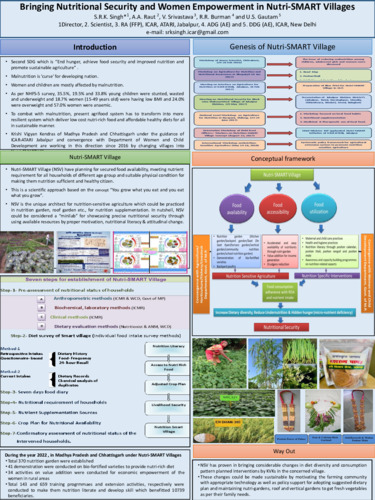Bringing nutritional security and women empowerment through Nutri-SMART Villages
Abstract
In the past 30 years, agricultural production of India has increased and reached a self-sufficiency stage, but the status of malnutrition is a formidable challenge towards the holistic development of the country because women and children are still malnourished. To combat malnutrition, the present agriculture and food system has to transform into a more resilient system which delivers low-cost nutrient-rich food and affordable healthy diets for all in a sustainable manner. In this purview, Krishi Vigyan Kendras (KVKs) of Madhya Pradesh and Chhattisgarh under the guidance of ICARATARI Jabalpur and with the Department of Women and Child Development are working in this direction since 2016. They adopted one village where the malnutrition status of women and children were high, to make them nutrition secure for achieving nutritional security and transformed it into a Nutri-SMART Village (NSV). At present, 42 and 15 NSVs are operational in Madhya Pradesh and Chhattisgarh, respectively. KVKs conducted field demonstrations on nutrition gardens, food fortification and bio-fortified crop varieties; and organized capacity building and awareness programs for farm women and aganbadi workers to enhance nutrition literacy. Some innovative approaches like poshan thali, poshan rangoli, poshan garlands and poshan calenders were introduced and promoted to create awareness and deep understanding about the micronutrient-rich food items in their daily diets. Smallscale income-generation activities were promoted for women’s empowerment. During 2022, a total of 370 nutrition gardens were established, 41 demonstrations were conducted on bio-fortified varieties to provide a nutrient-rich diet, and 34 activities on value addition were conducted for economic empowerment of the women. As well, a total of 143 and 659 training programs and extension activities, respectively, were conducted to help increase people’s nutrition literacy and develop the skill of 10,739 beneficiaries. Thus NSVs are advocating nutrition-sensitive and specific agricultural interventions in a targeted approach to make food more available, accessible, diverse and nutritious to ensure nutrition security in the operational area.

